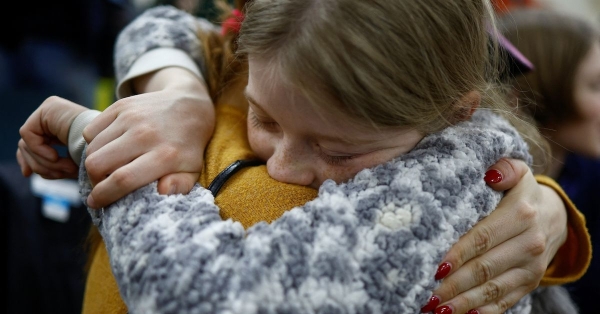Ukraine gets back more than 30 children from Russia after alleged deportation

After a complicated rescue mission that involved travel across four countries, mothers hugged their children as they crossed the border to Ukraine from Belarus.
Dasha Rakk, a thirteen-year-old girl, stated that she and her twin sister had made arrangements to leave Kherson, Russia, last year due to the war, and travel to a camp in Crimea for a few days. Russian officials stated that the children would stay longer once they arrived in Crimea.
She said, "They said that we would be adopted and that we will have guardians." "When they told us that we would stay longer, we all began to cry."
Natalia, Dasha’s mother, said that she traveled from Ukraine via Poland, Belarus, and Moscow to meet her daughters. Russia has occupied Ukraine’s Crimea peninsula since 2014.
She described her journey to the camp as "very difficult" and said that she remained positive.
She said, "It was heartbreaking looking at the children who had been left behind and were crying behind that fence."
Kyiv believes that nearly 19500 children were taken to Russia and Russian-occupied Crimea after Moscow invaded February 2013. This is what Kyiv calls illegal deportations.
AdvertisementMoscow, which controls large areas of Ukraine’s south and east, denies abducting children, and claims they were taken away for their safety.
"Now, the fifth rescue mission is close to its completion. It was unique because of the number of children that we were able to return, as well as its complexity," Mykola Kuleba said. He is the founder of Save Ukraine humanitarian organization which helped organize the rescue mission.
Kuleba said Saturday at a Kyiv briefing that all 31 children who were brought home from Russia had stated that no one was trying to locate their parents.
He said that there were children who moved five times in five month, and some of them claimed they lived with rats or cockroaches. Kuleba stated that the children were sent to camps in Kherson and Kharkiv, which Russians call summer camps.
A request for comment was not received by the Russian Foreign Ministry immediately.
WARRANTY OF REST
The media briefing was held in Kyiv and three children, two boys and one girl, were there. Save Ukraine stated that they returned home from a previous mission in which 18 children were returned.
They claimed that they were separated from their parents and had been forced by Russian authorities to send their children from Kherson and Kharkiv to Russian summer camps. It was for a period of two weeks.
Briefing participants stated that they were required to stay at summer camps for between four and six months, and that they were often moved around during their stay.
"We were treated as animals." Vitaly, a Kherson child whose age is not known, said that they were kept in separate buildings. Vitaly said that their parents told them they no longer wanted them.
Last month, the International Criminal Court issued an arrest warrant against Russian President Vladimir Putin, and Maria Lvova-Belova (Russia’s children’s rights Commissioner), accusing them both of abducting Ukrainian children.
Moscow has not hidden a program under which it took thousands of Ukrainian children from occupied territories, but it presents it as a humanitarian campaign in order to protect orphans and abandoned children in conflict zones.
Russia denies the ICC allegations and says it doesn’t recognise the court’s jurisdiction. It also declares that the warrants are null and void.
Lvova Belova said last week that her committee acted on humanitarian grounds in order to protect children’s interests in an area of military action. She had not moved anyone against the will of them or their legal guardians or parents, who consent were always sought unless they were absent.
Kateryna Rashevska (a lawyer representing a Ukrainian NGO called Regional Centre for Human Rights) told the briefing that they were gathering evidence to prove that Russian officials had deliberately stopped the return of Ukrainian children.
She said: "In every story there are a variety of international violations and they cannot be ignored."
Share this article:



